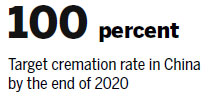Family members will be encouraged to share the same tombs, and ecologically friendly funerals will be promoted over the next five years in China, under a guideline jointly issued by central government departments designed to save land resources by stepping up funeral reforms.
The guideline, issued by nine departments on Wednesday, including the Ministry of Civil Affairs and National Development and Reform Commission, said the country will further promote eco-friendly funerals in the next five years, including sea burials and tree funerals - where ashes are buried and a tree is planted on the spot.
The guideline said burials that take up little or no land will be promoted in the next five years. In densely populated areas, authorities will promote vertical burials, including ways to store cremated remains in buildings, walls or towers.
The authorities will also encourage the use of smaller tombs and tombstones. Funerals that leave no ashes of the deceased will be promoted, it said.
The guideline added that the funeral traditions of ethnic groups will be respected, and authorities will encourage people from ethnic groups to choose burial methods consistent with both their cultural traditions and the eco-friendly burial requirements.

An unidentified official with the Ministry of Civil Affairs in charge of funeral affairs said in an online statement that the key to pushing forward green funeral reform is changing public conceptions.
"Communist Party of China members should take the lead in funeral reform," the statement said. "Ensuring that the role of Party members comes into play will be crucial to the success of the reform."
The guideline stipulates that Party members, especially government officials, who choose burial methods that violate the guideline will be punished.
China's deep-rooted funeral traditions, some of which hold that a person must receive a proper burial to ensure peaceful rest, has made previous government efforts to push reforms difficult.
Li Bosen, head of the 101 Institute of the Ministry of Civil Affairs, a government think tank that specializes in funeral affairs research, said last year that drastic efforts by local authorities to increase the cremation rate had resulted in incidents such as body snatching and elders committing suicide before funeral reforms could be carried out.
The country's cremation rate declined to 49.5 percent in 2012 from 53 percent in 2005 because of resistance from the general public, according to the ministry.
At a work conference in 2014, the ministry said it was targeting a cremation rate of close to 100 percent by the end of 2020.
